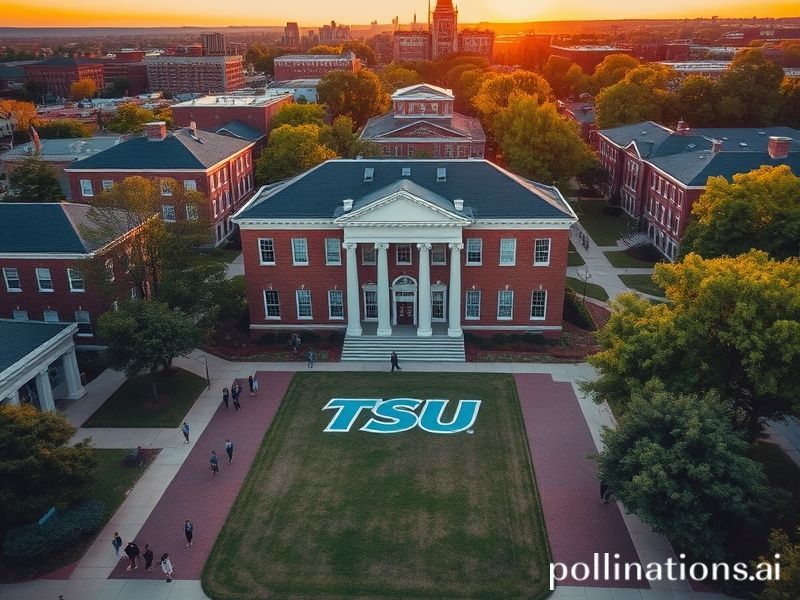How Tennessee State University Quietly Runs the World While Politicians Argue Over Spreadsheets
Nashville, Tennessee – To the average Berlin bureaucrat or Singaporean supply-chain analyst, Tennessee State University sounds like a minor footnote on the U.S. map, a place where the marching band plays “Rocky Top” and nobody questions why the local whiskey is older than the freshmen. But zoom out and the institution becomes a canary in the coal mine of global higher-education anxiety—equal parts triumph and tragicomedy, with a soundtrack that swings between gospel and trap music.
Founded in 1912 as the Agricultural and Industrial State Normal School for Negroes—yes, the original name was that blunt—TSU was carved out of Jim Crow’s leftovers. Today it graduates more Black STEM majors than any campus within a thousand-mile radius, a fact that causes polite coughing fits in European ministries still congratulating themselves on a single diversity scholarship. The university’s aerospace program, tucked beside the Cumberland River like an afterthought, has sent experiment packages to the International Space Station on SpaceX flights. Somewhere over the Sahara, a Malian physics student is reading the TSU payload manifest and wondering why his own state university’s lab can’t reliably keep the lights on.
Of course, the cosmic glow dims a bit when the Tennessee legislature meets. Last year lawmakers pondered withholding $58 million after auditors discovered the university had…wait for it…followed federal guidelines on tuition discounts for veterans. The ensuing uproar played like an episode of Veep scripted in Cyrillic: local politicians claimed fiscal prudence while simultaneously subsidizing a new stadium for a football team that loses with admirable consistency. International observers, accustomed to kleptocrats who at least bother to hide the money in Cypriot shell companies, watched in awe as the receipts were waved around on live television.
TSU’s endowment—roughly $95 million—wouldn’t cover half a season of Chelsea Football Club’s laundry bill, yet the university manages to export agricultural tech to Ghanaian peanut farmers and run cybersecurity bootcamps for Rwandan civil servants. The global south nods appreciatively; the global north Googles “endowment” and quietly pities anyone trying to run a research lab on the equivalent of Jeff Bezos’s weekend yacht fuel.
Meanwhile, Nashville itself has become a geopolitical funhouse mirror. Japanese carmakers, German healthcare giants, and Indian IT firms have set up shop nearby, lured by tax breaks and hot chicken. Their executives drop by TSU’s career fairs to poach bilingual engineers who grew up on food stamps, thereby solving the diversity quotas back in Stuttgart or Osaka without ever addressing why those quotas exist. The graduates leave, diplomas laminated against Southern humidity, and promptly discover that the promised salaries barely cover rent in the cities they’re imported to. The circle of life, Silicon Valley remix.
Then there’s the football team, the Tigers, whose games are broadcast on an obscure cable channel beamed into Caribbean sports bars at 3 a.m. In Port-au-Prince, insomniac teenagers wear knockoff TSU jerseys because the color scheme matches their favorite dancehall crew. None of them could locate Tennessee on a map, but they recognize the ritual: young Black men battering their anterior cruciate ligaments for the amusement of boosters whose grandparents wouldn’t have let those same players vote. The irony is richer than Nashville’s barbecue sauce, and twice as hard to digest.
And yet, against every cynical algorithm, TSU persists. Its nursing students vaccinated half of South Nashville during COVID-19 while the governor tweeted about “personal responsibility.” Its debate team recently beat Oxford, prompting the British press to investigate whether “American historically black colleges” were some sort of new franchise. Somewhere in Seoul, a K-pop producer is sampling the TSU marching band’s drumline for a track about resilience. The royalties, if they ever arrive, will probably pay for half a new library wing—assuming the state doesn’t decide libraries are woke.
In the end, Tennessee State University is less a campus than a global stress test: Can a place built from America’s original sin keep producing rocket scientists and social workers while legislators treat appropriations like a claw machine? The world is watching, half-horrified, half-hopeful, and thoroughly entertained. Because if TSU can make it, maybe—just maybe—the rest of us can too. And if not, at least the halftime show will be fire.







